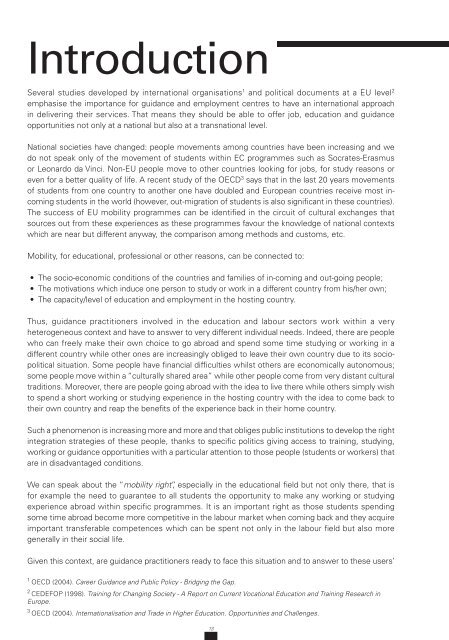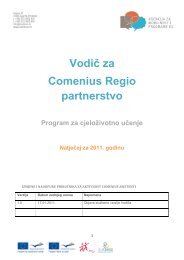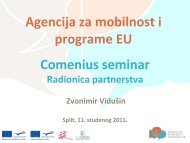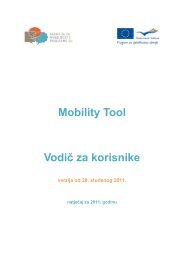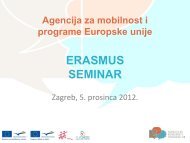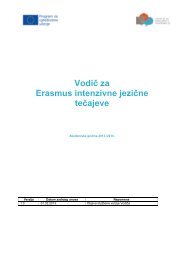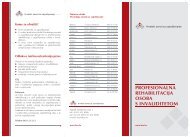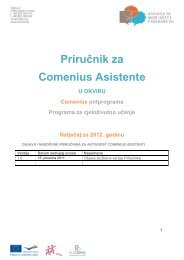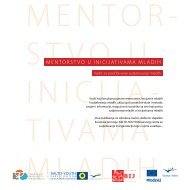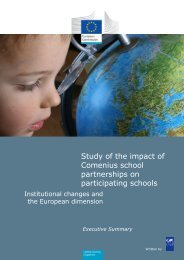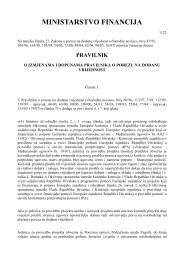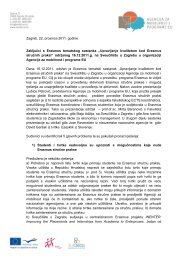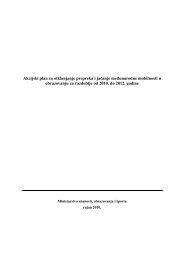libro v2-1.indd - ACADEMIA, programme européen d'échange de ...
libro v2-1.indd - ACADEMIA, programme européen d'échange de ...
libro v2-1.indd - ACADEMIA, programme européen d'échange de ...
You also want an ePaper? Increase the reach of your titles
YUMPU automatically turns print PDFs into web optimized ePapers that Google loves.
Introduction<br />
Several studies <strong>de</strong>veloped by international organisations 1 and political documents at a EU level 2<br />
emphasise the importance for guidance and employment centres to have an international approach<br />
in <strong>de</strong>livering their services. That means they should be able to offer job, education and guidance<br />
opportunities not only at a national but also at a transnational level.<br />
National societies have changed: people movements among countries have been increasing and we<br />
do not speak only of the movement of stu<strong>de</strong>nts within EC <strong>programme</strong>s such as Socrates-Erasmus<br />
or Leonardo da Vinci. Non-EU people move to other countries looking for jobs, for study reasons or<br />
even for a better quality of life. A recent study of the OECD 3 says that in the last 20 years movements<br />
of stu<strong>de</strong>nts from one country to another one have doubled and European countries receive most incoming<br />
stu<strong>de</strong>nts in the world (however, out-migration of stu<strong>de</strong>nts is also significant in these countries).<br />
The success of EU mobility <strong>programme</strong>s can be i<strong>de</strong>ntified in the circuit of cultural exchanges that<br />
sources out from these experiences as these <strong>programme</strong>s favour the knowledge of national contexts<br />
which are near but different anyway, the comparison among methods and customs, etc.<br />
Mobility, for educational, professional or other reasons, can be connected to:<br />
•<br />
•<br />
•<br />
The socio-economic conditions of the countries and families of in-coming and out-going people;<br />
The motivations which induce one person to study or work in a different country from his/her own;<br />
The capacity/level of education and employment in the hosting country.<br />
Thus, guidance practitioners involved in the education and labour sectors work within a very<br />
heterogeneous context and have to answer to very different individual needs. In<strong>de</strong>ed, there are people<br />
who can freely make their own choice to go abroad and spend some time studying or working in a<br />
different country while other ones are increasingly obliged to leave their own country due to its sociopolitical<br />
situation. Some people have financial difficulties whilst others are economically autonomous;<br />
some people move within a “culturally shared area” while other people come from very distant cultural<br />
traditions. Moreover, there are people going abroad with the i<strong>de</strong>a to live there while others simply wish<br />
to spend a short working or studying experience in the hosting country with the i<strong>de</strong>a to come back to<br />
their own country and reap the benefits of the experience back in their home country.<br />
Such a phenomenon is increasing more and more and that obliges public institutions to <strong>de</strong>velop the right<br />
integration strategies of these people, thanks to specific politics giving access to training, studying,<br />
working or guidance opportunities with a particular attention to those people (stu<strong>de</strong>nts or workers) that<br />
are in disadvantaged conditions.<br />
We can speak about the “mobility right”, especially in the educational field but not only there, that is<br />
for example the need to guarantee to all stu<strong>de</strong>nts the opportunity to make any working or studying<br />
experience abroad within specific <strong>programme</strong>s. It is an important right as those stu<strong>de</strong>nts spending<br />
some time abroad become more competitive in the labour market when coming back and they acquire<br />
important transferable competences which can be spent not only in the labour field but also more<br />
generally in their social life.<br />
Given this context, are guidance practitioners ready to face this situation and to answer to these users’<br />
1<br />
OECD (2004). Career Guidance and Public Policy - Bridging the Gap.<br />
2<br />
CEDEFOP (1998). Training for Changing Society - A Report on Current Vocational Education and Training Research in<br />
Europe.<br />
3<br />
OECD (2004). Internationalisation and Tra<strong>de</strong> in Higher Education. Opportunities and Challenges.<br />
13


